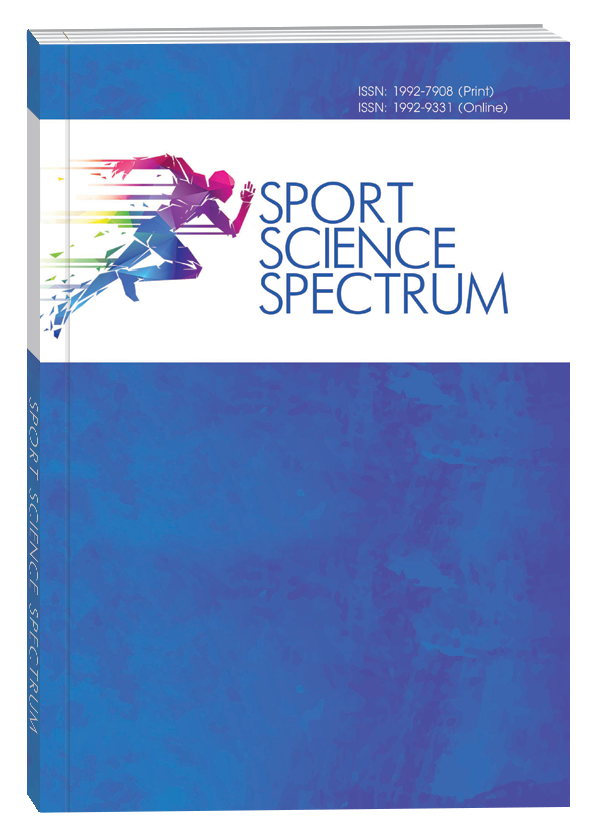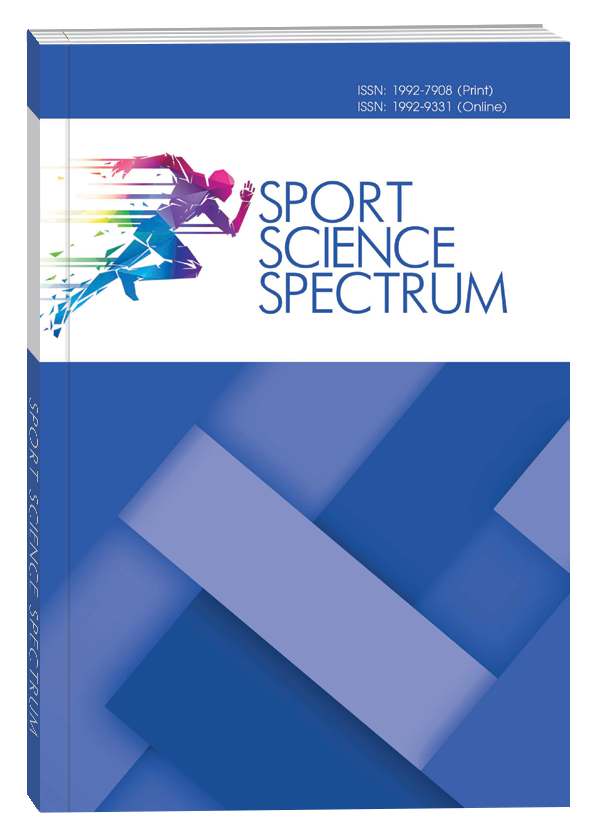ФОРМУВАННЯ СТРУКТУРИ ПРОФЕСІЙНИХ КВАЛІФІКАЦІЙ ФАХІВЦІВ З ОЗДОРОВЧОГО ФІТНЕСУ В УКРАЇНІ
DOI:
https://doi.org/10.32782/spectrum/2025-1-5Ключові слова:
професія, кваліфікація, рамка кваліфікації, стандартизація, фахівець, фітнесАнотація
В Україні активно формується Національна система кваліфікацій, зокрема у сфері оздоровчого фітнесу, що є важливим кроком для розвитку її кадрового забезпечення. Ураховуючи швидкий розвиток вимог до кваліфікацій фітнес-спеціалістів, необхідність увідповіднення національних кваліфікацій міжнародним стандартам, дослідження мало на меті розробити структуру професійних кваліфікацій у сфері оздоровчого фітнесу та оцінити її відповідність рівням Національної рамки кваліфікацій. Методи. Дослідження проведено на основі аналізу літературних джерел, нормативно-правових документів, наукових досліджень, програм підготовки фахівців з фітнесу та інших документів і матеріалів. Також використовували моделювання, компаративний метод та метод порівняння й зіставлення. Результати: розроблена структура професійних кваліфікацій для фахівців з фітнесу містить чотири основні кваліфікації, що визначені на 3, 4, 6 та 7 рівнях Національної рамки кваліфікацій. А саме фітнес-інструктор, фітнес-тренер, консультант з фітнесу та здорового способу життя, менеджер з фітнесу. Визначено мету професійної діяльності за кожною професією. Здійснено порівняльний аналіз розробленої структури із секторальною рамкою кваліфікацій EuropeActive. Висновки. Установлено, що є різні підходи щодо розробки та впровадження галузевих рамок кваліфікацій, однак більшість з них передбачає комплексний підхід, що враховує як потреби ринку праці, особливості кадрової політики, так і специфіку національної системи освіти та професійної підготовки фахівців.
Посилання
1. Базиляк Н. Формування гуманітарної політики в освітній сфері Європейського Союзу щодо реалізації програм безперервного навчання громадян протягом життя. Наукові праці Міжрегіональної Академії управління персоналом. Політичні науки та публічне управління. 2022. № 1(61). С. 7–11.
2. Дутчак М. В. Актуальність та передумови розроблення галузевої рамки кваліфікацій у системі спорту в Україні. Вісник Прикарпатського університету. Серія: Фізична культура. 2020. Листопад 03; 35: 24–31.
3. Дутчак М. Сучасна концепція кадрового забезпечення в сфері фізичної культури і спорту в Україні. Теорія і методика фізичного виховання і спорту. 2020. № 2. С. 45–56.
4. Про освіту : Закон України. URL: [https://zakon.rada.gov.ua/laws/show/2145-19#Text.
5. Заславський В. А., Нікітченко М. С., Омельчук Л. Л., Ямкова О. М. Розробка та впровадження секторальної рамки кваліфікацій у галузі «Інфор- маційні технології». Київ : Київський національний університет імені Тараса Шевченка, 2016. 88 с.
6. Національна рамка кваліфікацій. URL: https://zakon.rada.gov.ua/laws/show/1341-2011-%D0%BF#Text.
7. Національне агентство кваліфікацій Реєстр кваліфікацій. URL: https://register.nqa.gov.ua/
8. Проєкт Закону України «Про національну систему кваліфікацій». URL: https://ips.ligazakon.net/document/JI02884A?an=186
9. Рашкевич Ю. М., Андрійчук С. К. Секторальні рамки кваліфікацій як інструмент узгодження дескрипторів європейської мета-рамки та створення профілів освітніх програм. Міжнародний науковий бюлетень, 2015. Т. 1 (10). С. 41–64.
10. Семигіна Т. В., Рашкевич Ю. М., Солодка Н. М. Секторальні рамки кваліфікацій у світовому контексті та перспективи для України. Освітня аналітика України, 2023. Т. 3(24). С. 21–33. DOI: https://ssrn.com/abstract=4637597.
11. Семигіна Т. Європейська політика щодо визнання професійних кваліфікацій: уроки для України. Науковий часопис Національного педагогічного університету імені М. П. Драгоманова. Серія 22. Політичні науки та методика викладання соціально-політичних дисциплін, 2020. № 8. С. 5–14.
12. Семигіна Т., Баланюк Ю. Формування політики щодо професійних кваліфікацій у контексті глобальної освітньої та трудової мобільності. Модернізація публічного управління в умовах глобальних змін світового простору. Львів – Торунь: Ліга-Прес, 2021. С. 109–136.
13. Семигіна Т., Баланюк Ю., Семенець-Орлова І. Політика Європейського Союзу щодо взаємного визнання професійних кваліфікацій. Наукові праці МАУП. Політичні науки та публічне управління, 2022. Вип. 3. С. 96–105.
14. Adamis-Csazar K., Keyser L., Fries-Tersch E. (et al.). Labour mobility and recognition in the regulated professions. Luxembourg. 2019.
15. European Qualifications Framework for Life Long Learning. URL: Доступно: https://europass.europa.eu/system/files/2020-05/EQF-Archives-EN.pdf
16. European Sport Coaching Framework. URL: Доступно: https://icce.ws/wp-content/uploads/2024/03/European-Sport-Coaching-Framework.pdf
17. European Union Agency for Asylum. European Sectoral Qualifications. URL: https://euaa.europa.eu/publications/european-sectoral-qualifications-framework.
18. Sectoral Qualifications Framework. Europe active URL: https://www.europeactive-standards.eu/es-context
19. Sectoral Qualifications Framework for Sport URL: https://kwalifikacje.edu.pl/wp-content/uploads/publikacje/PDF/srk/SRKS_ENG_FIN_internet.pdf
20. 7-Step Model: A Practical Model Derived from the Lifelong Learning Strategy. URL: http://eose.org/approach/7-step-model.
Завантаження
Опубліковано
Номер
Розділ
Ліцензія

Ця робота ліцензується відповідно до ліцензії Creative Commons Attribution-NonCommercial 4.0 International License.





